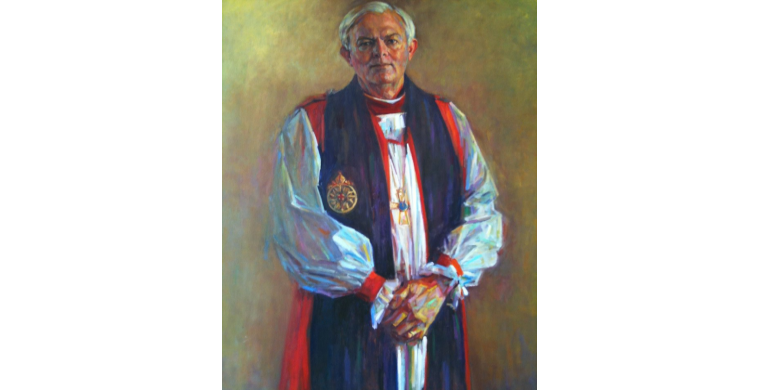'Choose Heresy': Bishop Peter Lee's Complicated Legacy
By Jeffrey Walton
www.juicyecumenism.com
July 9, 2022
A leading Episcopal Church bishop at the center of church disputes on biblical authority, marriage and human sexuality has died.
"If you must make a choice between heresy and schism, always choose heresy," longtime Episcopal Diocese of Virginia Bishop Peter James Lee famously quoted Presbyterian scholar James I. McCord with approval. "As a schismatic, you have torn and divided the body of Christ."
Lee was 84. The Richmond Times-Dispatch has an obituary viewable here. https://richmond.com/news/local/obituaries/rt-rev-peter-james-lee-dies-former-bishop-of-episcopal-diocese-of-virginia/article_69545029-651e-5c59-84f0-f302d8a9aae3.html
Readers of this blog are likely already familiar with Lee's litigious policy towards former Episcopalians who sought to depart his diocese and retain control of their parish properties. Less widely known is that Lee was a supporter of the work of the Institute on Religion & Democracy during the leadership of IRD President Diane Knippers, including diocesan financial support as late as 2003.
Lee's episcopacy was among the more consequential, not only for its long duration (1984-2009) but also for his attempted role in establishing a "middle aisle" in a rapidly liberalizing Episcopal Church.
"Peter was an institutional man," past Falls Church Anglican Rector John Yates recalled to me in a phone conversation about his former bishop. "He was very loyal to the systems of the church."
Lee was rewarded for that loyalty, seen in multi-year lawsuits against departing Anglicans. At retirement, he went on to take a victory lap as interim Dean of both General Theological Seminary and the American Cathedral in Paris. The former is now on its last legs and slated to be placed into the orbit of the much larger Virginia Theological Seminary, where Lee served as Chairman of the Board across 16 years.
Yates described a friendly relationship with Lee early in his episcopacy and remembered him as a man of principle and a hard worker, but one "who did not know the scriptures very well."
Lee had said to journalist Alberta Lindsey that the biggest disappointment in his tenure involved 11 breakaway Virginia churches, of which The Falls Church was the largest.
Yates noted when it became clear that the denomination was steadfastly moving left, then Truro Church Rector Martyn Minns, Church of the Apostles Rector David Harper, All Saints Church Rector John Guernsey and he "spent quite a bit of time with him, trying to help him see that the denomination was headed in a wrong direction doctrinally and morally."
"He felt the Holy Spirit didn't quit speaking when the canon was closed, and that the Holy Spirit was still speaking," Yates said of Lee. "It wasn't easy for him to adjust to all the changes in sexual morality, and he didn't grow up believing in that, and as the church moved in that direction he believed it was the right thing to support because he was committed to the church."
Following the election and consecration of Gene Robinson as Bishop of the Episcopal Diocese of New Hampshire, Lee established a committee that worked for two years on an acceptable plan of departure for those churches that wished to depart the Diocese of Virginia and the Episcopal Church.
"We wanted to do it a different way," Yates stated, hoping for a cordial separation in contrast to lawsuits already unfolding in other parts of the denomination.
The committee's agreement was not to last. Newly-installed Presiding Bishop Katharine Jefferts Schori directed Lee to cease negotiation on departures. He did, informing the churches that there was "a new sheriff in town."
"He just basically pulled the rug out from under us at the last minute," Yates described. "We felt like he had made an agreement with us."
It was hard to maintain a close relationship after, Yates recounted: "It was sad. It was clear that we were not on the same wavelength."
Lee, who was elected at 43, eventually became the senior most bishop in the House of Bishops, and Yates believes that seniority gave him room to uphold prior agreements.
"He could have helped things be quite different," Yates assessed.
My own disappointment with Lee is partly rooted in his short-sighted refusal to let the Falls Church plant churches in the inner suburbs of Washington. When Falls Church did go on to plant congregations (within the Anglican Church in North America) it found extraordinary success.
Christ the King Alexandria, Restoration Anglican Arlington, Christ Church Vienna -- all took root. None would have been possible within the Diocese of Virginia, which gave neighboring parishes veto power over church plants within the same deanery.
More positively, Lee's working relationship with Knippers was directly engaged in international religious liberty concerns.
I first crossed paths with the work of IRD as a young hill staffer in the office of Congressman Frank Wolf (R-VA). Wolf's office organized a demonstration outside of the Embassy of Sudan protesting the confiscation of Episcopal Church of Sudan property by the Khartoum government. The other two sponsors of the demonstration were IRD and the Diocese of Virginia.
Also at that demonstration was then-IRD Religious Liberty Director Faith McDonnell, who worked with Lee as IRD brought a resolution on the persecuted church to the diocesan convention. Faith recalled to me that the resolution drew opposition from people who wanted to dilute it to be about all religions. Lee agreed that there was a need for a statement specifically for Christians. (McDonnell is a congregant at Church of the Apostles Anglican, one of the formerly Episcopal parishes that lost its property in litigation with the diocese).
It was also through Lee that close partnerships were formed between diocesan churches that became deeply involved in the church in Sudan.
Lee personally wrote to Pakistani Prime Minister Benazir Bhutto in the 1990s on behalf of an illiterate Pakistani Christian boy accused of blasphemy. His involvement helped in the boy's release and departure from Pakistan, McDonnell recalls.














